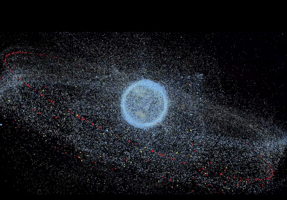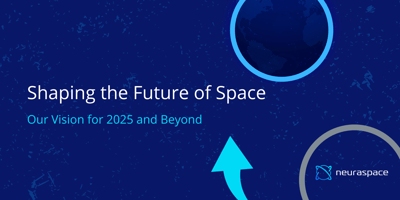Exploring Space Sustainability: Q&A with Chiara Manfletti on the ESA's Zero Debris Charter
-1.png?width=800&height=418&name=LinkedIn_Neura%20(1)-1.png)
Welcome to an insightful Q&A session with Chiara Manfletti, Director and COO of Neuraspace, as we delve into the latest release of the European Space Agency's (ESA) Zero Debris Charter. With a wealth of experience and expertise, Chiara provides a unique perspective on the Charter's significance in addressing the critical issue of space debris. Join us as we explore the innovative measures outlined in the latest release, the impact it could have on the space sector, and Neuraspace's role in advancing sustainable practices.
How important is this charter to improve space sustainability and reduce space debris?
There is an urgent need for ambitious actions on space sustainability ranging from debris prevention, mitigation, and remediation from all space stakeholders. The Zero Debris Charter recognises that meaningful improvements to space safety and sustainability can only be achieved through the cooperative efforts of a community committed to act towards jointly defined measurable targets for 2030.
How likely is it that other top space nations such the USA, China, India, Japan and newcomers like the Arab nations (e.g. Saudi Arabia and the UAE) will follow suit?
The charter is a non-legally binding agreement, but it fosters a community of proactive actors working collectively towards jointly defined targets for 2030. The charter also supports existing multilateral and multi stakeholder endeavours to achieve space safety and sustainability. Space safety and sustainability are not just topics of environmental importance, but they are also markets in the making. Nations will support efforts without a doubt latest when they recognise the latter. The race is on….some may however not know that there is a race ongoing….
Do we also need a binding charter at regional level or would this put actors within that region at a disadvantage to their competitors in other countries? In other words, would we need a globally binding charter first?
Space safety and sustainability are markets in the making. There will be a competitive advantage to those that realise this and act accordingly.
What would/could be a necessary next step for further improvements and when can we expect that?
Development of performance indicators that uphold the guiding principles and support the achievement of the targets, could possibly be the immediate next steps. Technology development is underway. The adoption of these technologies is now the priority.
With the expected rise of 2nd generation constellations and increase of space assets in mind, is the target of keeping/achieving space debris generation through collisions and break-ups below 1 in 1000 good enough to keep space sustainable?
The Zero Debris Charter targets are aimed for the time frame 2030. Clearly the situation in orbit will evolve and revisiting the targets and/or new targets will be required. Getting started is key. A target of break-ups below 1 in 1000 is a good start. Having a charter in place is a guideline to begin with, but it is important to continue to improve our knowledge and understanding of the population of space debris of all sizes, our impact on it, and its impact on us.
Can you explain Neuraspace's role in supporting the objectives of the Zero Debris Charter and its commitment to a "Zero Debris Future"?
Neuraspace is committed to supporting the objectives of the Zero Debris Charter and a "Zero Debris Future'' by developing and implementing innovative technologies and strategies to minimise the unintentional generation of space debris. As a signatory to the charter, we are committed to contributing to the achievement of the targets, especially via our products that help and support satellite operators with collision avoidance.
The targets where we see a definite contribution are - keeping the probability of space debris generation through collisions and break-ups below 1 in 1000 per object during the entire orbital lifetime, and improving access to timely and accurate data on space objects down to a size of 5 cm or smaller in low Earth orbit and 20 cm or smaller in geostationary Earth orbit.
Above all, by providing services that are commercially viable and attractive Neuraspace contributes in moving space sustainability from a purely environmental topic to one that is viable and has market traction and validation.
How do you foresee the Zero Debris Charter contributing to the safety and sustainability of space activities, and what inspired your organisation to join this initiative?
The Zero Debris Charter is a contribution towards space safety and sustainability, and Neuraspace joined this initiative to support the collective efforts of a community committed to act towards jointly defined, ambitious, and measurable targets for 2030.
We believe that meaningful improvements to space safety and sustainability can only be achieved through the cooperative efforts of all space stakeholders, and the charter provides a framework for regular exchanges on respective contributions towards the achievement of the targets, and encourages any entity demonstrating a strong commitment to advancing space safety and sustainability to join the charter.
The Charter emphasises minimising the unintentional generation of space debris. Could you share Neuraspace's strategies and technologies for achieving this goal?
Current solutions rely on manual processes, traditional technologies and sensors, and cannot cope with the 15x increase in space assets. Using Neuraspace “Smarter Space Traffic Management (STM)” Platform, satellite operators can avoid possible collisions, thereby decreasing the probability of generating unintentional generation of space debris.
Our collision avoidance system also offers timely and accurate information of space objects, which enhances the decision-making capabilities for collision avoidance. With improved data mining using data fusion and proprietary ML algorithms, our STM platform offers significant benefits for businesses. These include a 100x increase in decision-making efficiency, an 80% reduction in staff time for safety-critical operations through automation, and 20% more planning time. They also offer optimised spacecraft/constellation management for extended lifespans and increased commercial revenue. The enhanced data analysis also reduces false alerts by 30% and eliminates unnecessary manoeuvres, resulting in substantial cost savings and reduced human intervention.
The charter outlines specific targets for 2030. What steps is Neuraspace taking to contribute to the achievement of these targets?
With a forward-looking approach, we launched our STM platform in July 2022. We are uniquely capitalising on effective data fusion strategies, analysis of data via machine learning algorithms and providing accurate and timely suggestions for collision avoidance. Improving access to timely and accurate data on space objects down to a size of 5 cm or smaller in low Earth orbit and 20 cm or smaller in geostationary Earth orbit to enhance decision-making capabilities for collision avoidance, is a significant contribution towards the implication of the charter.
Further Neuraspace is a member of the Space Sustainability Rating (SSR).
Neuraspace is a signatory to the Charter. Can you share your organisation's plans for regularly exchanging information and progress on achieving the Charter's targets with other partners?
As a signatory to the Zero Debris Charter, Neuraspace plans to regularly exchange information and progress on achieving the charter's targets with other partners. The charter invites regular exchanges on respective contributions towards the achievement of the targets defined in Paragraph 2, and Neuraspace is committed to contributing to these exchanges.
How does Neuraspace plan to collaborate with other partners and encourage additional entities to join the Charter, as outlined in Paragraph 3, especially those demonstrating a strong commitment to space safety and sustainability?
The charter encourages any entity demonstrating a strong commitment to advancing space safety and sustainability to join the charter, and Neuraspace is committed to promoting the charter and fostering a community of proactive actors working collectively towards jointly defined ambitious and measurable targets for 2030.
One example is as mentioned above is Neuraspace’s membership of Space Sustainability Rating (SSR) in which we play an active role in pushing forward policies and strategies for space sustainability.
---



